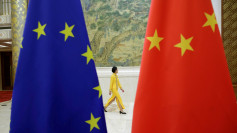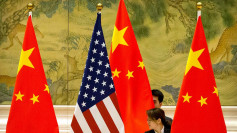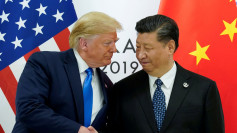In light of the ongoing challenges faced by China's stock market, regulators are intensifying their scrutiny on hedge funds and brokerages that employ quantitative trading strategies, according to Reuters. This move comes as public sentiment grows increasingly critical of sectors that can capitalize on stock price declines and market volatility.
Quantitative trading, often referred to as "quant trading," involves the use of mathematical models and algorithms to identify trading opportunities. These strategies can be particularly effective during periods of market instability, allowing traders to profit from both rising and falling stock prices. However, in a market environment like China's, where many retail investors are experiencing significant losses, there's a growing perception that quant traders might be exacerbating the downturn.
The image of a man wearing a protective mask inside the Shanghai Stock Exchange building underscores the challenges faced by the Chinese financial sector. Not only is the country grappling with the economic implications of the ongoing global pandemic, but it's also confronting internal pressures from a volatile stock market and public dissatisfaction.
Regulators' decision to probe certain hedge funds and brokerages is seen as a response to this public outcry. By examining the practices of these entities, authorities aim to ensure that no unfair advantages are being taken and that the market remains a level playing field for all participants.
It's worth noting that while quantitative trading strategies can indeed profit from market downturns, they are not inherently malicious or detrimental to the market. In many cases, they provide liquidity and can help stabilize prices. However, in a climate of widespread public anger and mistrust, perceptions matter, and regulators are keen to show that they are taking action.
The broader implications of this scrutiny remain to be seen. If regulators find evidence of wrongdoing or manipulation, it could lead to tighter regulations for the quant trading sector in China. On the other hand, if the investigations conclude that these strategies are not contributing to the market's challenges, it could lead to a more informed public discourse on the role of quantitative trading in modern financial markets.
In either case, the move underscores China's commitment to maintaining stability and fairness in its financial markets. As the country continues to position itself as a major global economic player, the actions of its regulators will be closely watched by investors and market participants worldwide.






